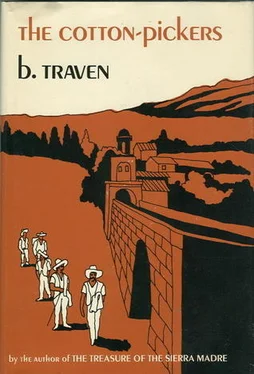B. Traven - The Cotton-Pickers
Здесь есть возможность читать онлайн «B. Traven - The Cotton-Pickers» весь текст электронной книги совершенно бесплатно (целиком полную версию без сокращений). В некоторых случаях можно слушать аудио, скачать через торрент в формате fb2 и присутствует краткое содержание. Год выпуска: 1969, Издательство: Hill and Wang, Жанр: Проза, на английском языке. Описание произведения, (предисловие) а так же отзывы посетителей доступны на портале библиотеки ЛибКат.
- Название:The Cotton-Pickers
- Автор:
- Издательство:Hill and Wang
- Жанр:
- Год:1969
- ISBN:нет данных
- Рейтинг книги:3 / 5. Голосов: 1
-
Избранное:Добавить в избранное
- Отзывы:
-
Ваша оценка:
- 60
- 1
- 2
- 3
- 4
- 5
The Cotton-Pickers: краткое содержание, описание и аннотация
Предлагаем к чтению аннотацию, описание, краткое содержание или предисловие (зависит от того, что написал сам автор книги «The Cotton-Pickers»). Если вы не нашли необходимую информацию о книге — напишите в комментариях, мы постараемся отыскать её.
—Book World
The Cotton-Pickers — читать онлайн бесплатно полную книгу (весь текст) целиком
Ниже представлен текст книги, разбитый по страницам. Система сохранения места последней прочитанной страницы, позволяет с удобством читать онлайн бесплатно книгу «The Cotton-Pickers», без необходимости каждый раз заново искать на чём Вы остановились. Поставьте закладку, и сможете в любой момент перейти на страницу, на которой закончили чтение.
Интервал:
Закладка:
After four days of strike, the Moderna agreed to all the union’s demands.
12
One afternoon, about three weeks after the Moderna strike was settled, when there were only a few customers in the café, Morales went to Doux and said: “Now listen, Señor, an eight-hour day, twelve pesos a week, one full meal a day, and coffee and rolls twice a day.”
For a moment Doux looked scared, but he quickly collected himself and said: “Come along to the cashier’s counter, Morales. There are your wages, you may go. You’re dismissed, fired!”
Morales turned around, took off his white jacket, and picked up the money that Doux had set down on the counter. All the other waiters, who had been watching, immediately took off their jackets and went up to the counter. Taken aback, Doux paid them their wages and let the men go; he was quite sure that he could get other men right away.
In his anger Doux had roughly pushed his wife’s nose out of the till, almost knocking her off her tall stool. With everything having happened so suddenly, Señora Doux had looked on speechless, for once.
“What happened?” she now managed excitedly to ask. “Why did you pay them?”
“Imagine asking me to double their wages and shorten their hours! I fired them without even listening to all the further demands they had in store for us.”
At this explanation, Señora Doux calmed down. “That was the most sensible thing, cheri, you have ever done in your life. We have been overpaying them wastefully anyway since the day we were fools enough to get into business in this godforsaken country where everybody seems to be going crazy with what they call their Revolution. The ones you fired were Bolsheviks anyway. They were thieves on top of that, never turning in the exact amount they received from the customers.”
“Now don’t you worry, cherie. In a few hours we’ll get more waiters than we need. They’re running around falling over their own feet in their eagerness to land a job.”
Señora Doux finished serving the few customers. When new customers arrived and saw that there were no waiters they did not even sit down but left at once. A few foreigners came in, ordered something, and thought the slow service was a local peculiarity.
The following day there were pickets outside the café and handbills were distributed with great gusto. Any person now wanting to enter had to confront the pickets, but everything was quite calm; there was no sign of violence. There were no police around.
Aside from a few of Doux’s regular customers, only foreigners went in. They couldn’t read the handbills and hadn’t understood what the pickets had said to them. The pickets, of course, didn’t bother the foreigners, who were mostly North American, English, or French and who, soon feeling the atmosphere to be depressing, quickly left the place, some of them without touching the food or drink they had ordered.
To Señora Doux’s chagrin, waiters were not falling over themselves to get a job. Finally, after two days, Doux found two, one an Italian, the other a Yugoslav; both were in rags, pitiful specimens. Doux gave them white jackets, shirt fronts and collars, and black bow ties, but no pants or shoes, and it was in the lower departments where the two fellows looked the most deplorable. They couldn’t understand a word of Spanish and were quite useless as waiters; but Doux wanted them there only to spike the guns of the pickets, so to speak.
In the evening at about half past eight the Italian was standing at one of the doors, all of which were wide open so that you could see from the outside everything that happened inside, as clearly as if it were happening in the middle of the street. That was the local way, for the customers liked to look out and liked to be seen, just as the passers-by enjoyed looking in and seeing people having a pleasant time in a café.
The Italian stood at the door and flapped his napkin, proud of being a waiter; in normal circumstances he might perhaps have been a good dishwasher. The pickets took little notice of him, merely casting a glance in his direction now and then.
Before long, a young fellow came along with a heavy wooden stick in his hand. The proud new waiter instinctively took a step backward; but the young man mounted the doorstep and struck him two sound blows on the head. Then he threw the stick down and casually walked away.
The waiter fell headlong, bleeding profusely from the wound on his head. Doux rushed to the door calling “Police! Police!” A policeman appeared, swinging his truncheon. The few customers in the café quickly left the place.
“They’ve killed him!” shouted Doux.
“Who did?” asked the policeman.
“I don’t know,” answered Doux, “probably those waiters who are on strike.”
Two of the pickets immediately sprang forward and shouted: “If you say that again, you son-of-a-bitch, well break every bone in your body.”
Señor Doux quickly retreated into the café and said no more.
“Did you see who struck this man here?” a second policeman who had come up asked the pickets.
“Yes, I saw him,” said one of the pickets. “A young fellow came up with a piece of wood — there, it’s still lying there — and just hit out at him.”
“Do you know the fellow?”
“No. He doesn’t belong to our union.”
“Then he had nothing to do with the strike. It’s probably some other affair; perhaps some skirts involved.”
“No doubt it is,” the picket agreed.
The two policemen took the fallen waiter to the station, where he was bandaged up and kept overnight for his safety.
“Hey, you in there, yes, you, you dirty scab,” the pickets called into the Yugoslav, “how long are you going to stay in there? You’ll get one with an iron bar. We haven’t got any more wood to spare.”
As all this was said in Spanish, the Yugoslav didn’t understand a word, but he sensed what was being said to him and, turning pale, he retreated to the back of the room.
Señor Doux had heard and of course understood. He ran to the door and again called for the police, but none came. A quarter of an hour passed. Then he saw a policeman standing on the corner and called him over.
“The pickets have threatened to kill my waiter!”
“Which one threatened to kill him?” asked the policeman. “Him!” and Doux pointed to Morales, who hadn’t made any threats, but who was most hated by Doux, of course.
“Did you threaten to kill the waiter?” asked the policeman.
“No, I didn’t, and the thought would never occur to me,” said Morales. “I wouldn’t even speak to the dirty, stinking scab, dirty and stinking all over as hell.”
“I can quite believe it,” said the policeman. “Now, who did threaten to kill him?”
“I told him not to come too close to the door because something might unexpectedly drop on his head from the roof or the balcony and hurt him,” said one of the pickets.
The policeman turned around to Señor Doux, who was standing in the doorway. “Now, listen here, Señor, what do you mean by saying such things? They’re simply not true.”
“Well, they half killed the other waiter,” Doux said defensively.
“You’d better make it up with your men,” the policeman said. “Then things like this won’t happen.”
“A fine thing,” bellowed Doux, “a man can’t even get proper protection from the police any longer.”
“Not so fast,” said the policeman. “You’d better stop insulting the police force, or I might turn you in.”
“I’m a taxpayer and I’ve got a right to get police protection.”
“What have taxes to do with it?” the policeman interrupted. “The waiters pay taxes, too. Settle your affairs with your men and quit calling for the police.”
Читать дальшеИнтервал:
Закладка:
Похожие книги на «The Cotton-Pickers»
Представляем Вашему вниманию похожие книги на «The Cotton-Pickers» списком для выбора. Мы отобрали схожую по названию и смыслу литературу в надежде предоставить читателям больше вариантов отыскать новые, интересные, ещё непрочитанные произведения.
Обсуждение, отзывы о книге «The Cotton-Pickers» и просто собственные мнения читателей. Оставьте ваши комментарии, напишите, что Вы думаете о произведении, его смысле или главных героях. Укажите что конкретно понравилось, а что нет, и почему Вы так считаете.











